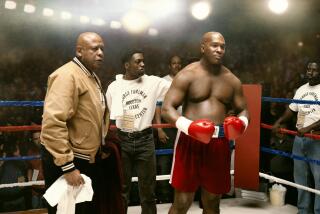‘Rules’ polished to original luster
“ ‘Rules of the Game’ taught me the rules of the game.”
-- ROBERT ALTMAN
For the record:
12:00 a.m. Dec. 27, 2006 For The Record
Los Angeles Times Wednesday December 27, 2006 Home Edition Main News Part A Page 2 National Desk 1 inches; 36 words Type of Material: Correction
Nuart phone number: A story in Sunday’s Calendar section about an upcoming screening of the film “The Rules of the Game” at the Nuart Theatre included an incorrect phone number. The correct number is (310) 281-8223.
For The Record
Los Angeles Times Thursday December 28, 2006 Home Edition Main News Part A Page 2 National Desk 0 inches; 28 words Type of Material: Correction
“Rules” director: Sunday Calendar’s Cine File column misidentified “The Rules of the Game” director Jean Renoir as being second from the left. He was at the far left.
For The Record
Los Angeles Times Sunday December 31, 2006 Home Edition Sunday Calendar Part E Page 2 Calendar Desk 1 inches; 55 words Type of Material: Correction
“The Rules of the Game”: Last Sunday’s Cine File column about the screening of “The Rules of the Game” at the Nuart Theatre included an incorrect phone number. The correct number is (310) 281-8223. Also, the caption under the accompanying photograph identified director Jean Renoir as second from left. He was at the far left.
IN the early ‘60s an emotional Jean Renoir stood before a packed audience at UCLA’s Royce Hall prior to a premiere screening of “Rules of the Game” and thanked two young French cineastes, Jean Gaborit and Jacques Marechal, for restoring his prophetic 1939 film, reviled upon its opening in Paris but subsequently a staple of critics’ and historians’ all-time great film lists.
Clearly, he had believed he would never see his masterwork reassembled as he intended, having twice cut it in desperation just after its release. His parting words at Royce Hall remain unforgettable; he explained that he made films with the hope that they would make “audiences feel a little less lonely.”
Because the film’s negative was destroyed in a World War II bombing raid, Gaborit and Marechal labored three years to incorporate the trimmed footage, found untouched in a warehouse, with the best portions of the few copies of the soon-banned film that survived the war. They managed to reconstitute the film with less than a minute missing.
Only now has it become possible to see “Rules of the Game” as it looked upon its July 7, 1939, Paris debut. That’s because Criterion Films has undertaken a complete digital restoration of a fine-grain master print located in Paris after a painstaking search.
Enduringly influential and timely, “Rules of the Game” is at once a tragicomic tale of the vicissitudes of romantic love and a portrait of an obtuse privileged class hurtling France toward the abyss of war, viewed with Renoir’s formidable blend of compassion and unflinching clarity of vision.
What makes “Rules of the Game” so sublime is the effortless perfection of Renoir’s style -- its easy, natural flow, the faultlessness of the movement of characters as well as the camera. Every element on screen seems always to be in the right place at the right time -- and always viewed from just the right perspective.
The landing at Le Bourget of dashing aviator Andre Jurieux (Roland Toutain) is greeted with only slightly less excitement than that of Charles Lindbergh a little more than a decade earlier. He has been encouraged to attempt a bold flight by the beautiful Marquise Christine de la Chesnaye (Nora Gregor), with whom he has fallen in love and to whom she in turn is drawn, since her husband, Robert (Marcel Dalio), neglects her for his mistress, Genevieve (Mila Parely). Andre implores his friend Octave (Renoir himself), a rumpled, burly man who has long known Christine -- and loved her from afar -- to get him included in an upcoming house party at the Marquis’ glorious chateau in the Sologne, France’s hunting country.
In between brutal rabbit hunts and amateur theatricals -- one number features a dancing skeleton and a chorus of ghosts, both sequences laced with foreshadowing -- the chateau brims with confused and conflicted emotions. Just as the Marquis realizes he may actually love his wife more than his mistress, Christine accidentally receives an entirely misleading opposite impression only to be buffeted by her feelings for Andre and Octave.
Meanwhile, Christine’s maid (Paulette Dubost) has inflamed the jealousy of her husband (Gaston Modot), the Marquis’ game warden, through her flirtations with a local poacher (Julien Carette) turned house servant. At the outset everyone adheres to the “rules of the game,” upholding perfect manners -- every woman superbly gowned by Chanel -- and staying in their place in a social structure that nonetheless starts to crumble. It is mind-boggling to consider that this film opened a mere two months before the outbreak of World War II, an event Renoir stunningly anticipates. (Renoir initially had intended to update Alfred de Musset’s “Les Caprices de Marianne,” but as the script developed this inspiration was “reduced to a thread.”
As an Austrian, the warm, demonstrative Christine is regarded as much as an outsider as Marie Antoinette was before her -- and Gregor was in fact an Austrian princess. Yet the wealthy Marquis is highly regarded by his aristocratic friends even though he is a Jew whose fortunes undoubtedly would have changed tragically with the German occupation of France. Dalio, one of the stars of Renoir’s other prescient masterpiece, “Grand Illusion” (1938), made his way to Hollywood along with Renoir and his gifted art director Eugene Lourie. He had an enduring Paris-Hollywood career, appearing in numerous films as varied as “Casablanca” and “Catch-22” and worked with John Ford, William Wellman, George Cukor, John Huston and Howard Hawks in addition to other top French and American directors.
While Roger Ebert has expressed puzzlement that “this magical and elusive work” always seems to place second to “Citizen Kane” on best-films lists, Bertrand Tavernier, a major contemporary French director whose work reflects a deep knowledge and appreciation of world cinema, has said that he would “give the whole of ‘Citizen Kane’ ” for a shot like that of the guests arriving at the chateau “like in a Robert Altman film, with people talking, overlapping within the shot, and a wonderful depth of focus.” Indeed, for critic J. Hoberman “Rules of the Game” is “a movie that Woody Allen, Robert Altman and Mike Leigh, to name three, are always trying to remake.”
*
‘Rules of the Game’
Where: Nuart Theatre, 11272 Santa Monica Blvd., West Los Angeles
When: Friday through Jan. 4
Price: $7.25 to $9.50
Contact: (310) 291-8223
More to Read
Only good movies
Get the Indie Focus newsletter, Mark Olsen's weekly guide to the world of cinema.
You may occasionally receive promotional content from the Los Angeles Times.






